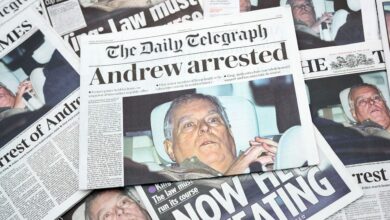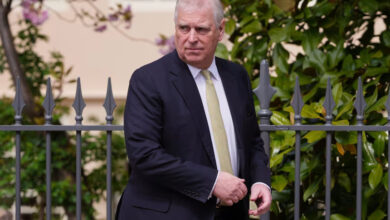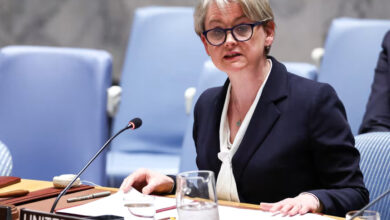London–When British Prime Minister Gordon Brown appeared before the Iraq Inquiry committee this month, he did more than defend the decision to go to war in 2003 and admit the inadequacy of post-invasion planning. Brown’s testimony helped to define what his country’s role will be in Iraq for years to come.
Grilled for some four hours by Sir John Chilcott’s inquiry in London’s Queen Elizabeth II Conference Centre, the former Chancellor said, “I think [the Iraqi war] was the right decision and made for the right reasons.”
However, he expressed his regret for the deteriorating situation the country has plunged into after the overthrow of Saddam Hussein from power in 2003. The British Premier also underlined that there are “important lessons” to be drawn from the way insecurity has erupted and escalated following the Operation Iraqi Freedom.
If Brown’s statements can be seen as a road map to the future of UK involvement in Iraq, then that country can expect both military and civilian British support in its reconstruction.
In April 2009, Britain marked the official end of its military mission in Iraq, which included 46,000 soldiers since 2003, of whom 8500 were deployed in southern Iraq. But a restricted number of military experts are still based at some Iraqi road junctions, as per agreements between Britain and Iraq.
Attallah Said, chairman of the Arab Labour Group, a part of the ruling Labour Party, says those military experts will train Iraqi police and armed forces, crucial steps in providing security and stabilizing the country in the near future.
“I see that the British military role in Iraq that started in 2003 will evolve into a contribution towards the logistic backup of the Iraqi army and the Iraqi security forces, added to the active participation towards the reconstruction of Iraq,” Said says.
Said stresses that the Arab Group opposed the 2003 invasion and is officially requesting that the Labour party form a solid plan to aid in the reconstruction of Iraq. A number of government officials, including former Foreign Minister Robin Cook and another 120 Labour MPs have requested the same.
Coalition forces are scheduled to completely withdraw from Iraq by 31 December, 2011, but Said remains skeptical. In light of the constant bombings and widespread violence, Said says that a complete pull-out is unlikely.
"They will only withdraw when the Iraqi army and police are trained enough to be able to effectively put an end to the current violence outbreak,” he says.
Abdul-Moneim al-A’tham, a London-based Iraqi political analyst, disagrees. Al-A’tham believes that the 2011 withdrawal deadline is final and realistic. Moreover, he says, US President Barack Obama pledged during his 2008 campaign to get American troops out of Iraq, a promise he has repeated since taking office.
Al-A’tham suggests that by 2011, the US will have secured its interests in Iraq by virtue of agreements, projects, and connections. He also says that the Iraqi people are waiting for the day when the American forces leave to reestablish their own sovereignty.
He also touched upon the concrete signs of transformation within the Iraqi public opinion, emerging from the recent Iraqi elections, suggesting a nascent emphasis on Iraqi nationalism, as opposed to peripheral loyalties that prevailed over the past seven years.
Apart from military aspects of British involvement in Iraq, al-A’tham anticipates that the future of UK-Iraqi civilian relations will benefit from the positive impressions left behind the “relatively reputable” British presence in the Basra region.
He says that on the eve of its military withdrawal from Iraq, the British government assured that the intention would be to advance relations between the countries, transcending the preoccupation with security concerns, and emphasizing the economic, technological, and educational domains, while offering the Iraqis all assistance in founding a state of institutions, law, and order.
In his last visit to London, Iraqi Prime Minister Nuri al-Maliki announced that his government had reached an agreement with the British Council. The council will contribute to the development of the Iraqi educational system, with £3 million to be allocated by the British government.
John Akker, Secretary of London’s Council for Assisting of Refugee Academics (CARA), which runs a special program for Iraqi refugees in the UK, predicts that the expected British engagement in Iraq will lead to the support and re-establishment of higher education in the country.
“We hope that Britain will do everything it can to help those many Iraqi universities that were destroyed after the invasion. We also hope that everything will be done to ensure Iraqi families that got disrupted because of the war get all contribution and assistance they need,” Akker says.
Still, a variety of challenges face British-Iraqi ties. These issues will play out in southern Iraq, Britain’s area of dominance in the country and an important region to Iran, which resents the British presence in Basra, where the Iranians are influential among the local Shia population.
It is likely that British projects in the area will face impediments from local government officials who are close to the Islamic Republic.
Samir al-Razi, an Iraqi expatriate who fled to London after the Iraqi war, sees that the future British involvement in his country will focus on a gradual military pull-out aimed at avoiding more British casualties. Al-Razi, who is one of 450,000 Iraqi emigrants in Britain, explained how the British will work on change their scope of involvement towards the political arena; “they will try to leave Iraq with the legacy of freeing the country,” he said.
He added that Iran poses a lurking threat to the future of Iraq. “The fear now is not only from the future British involvement but rather from the Iranian one. Iran is exerting control over the country from behind the borders,” he said.
Anglo-Iranian tensions have escalated recently over controversial issues which include Tehran’s alleged plan to develop a military nuclear program. The Iranian government also accuses British authorities of providing support for domestic reformist groups who staged sit-ins and demonstration to protest the outcomes of the June 2009 Iranian presidential elections.




